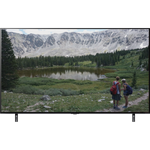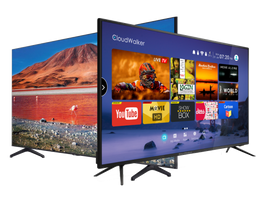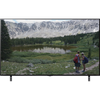A comparison of specs, key information, reviews, and best pricing from top retailers
Last updated -- hours ago | Report incorrect information
What we think

The PerfectRec TV team Learn more
Updated January 10, 2024·
If you are looking for a more cost-effective option, the LG NANO90 may suit you, as it is generally less expensive than the Samsung Q80C. However, the Samsung Q80C is a more recent model and offers slightly better overall picture quality and performance for watching movies and sports. Moreover, the Samsung Q80C also excels in bright room performance. On the other hand, the LG NANO90 may provide a better gaming experience due to a lower input lag, while still delivering good performance for sports content. Keep in mind both TVs have similar audio capabilities but do not come with particularly great built-in speakers. Give Feedback
this description is based on the product variant with some specs and product variant with some specs. At the time of writing, the variant with some specs cost some dollars and the variant with some specs cost some dollars.
Advantages of the LG NANO90 (LCD)
- Very good reflections
Advantages of the Samsung Q80C (LCD)
- Good for bright room
- Good for news, talk, & other TV
- Good for cartoons & animation
- Very good motion processing
- Good viewing angle
Key differences
Picture Quality
6.1


7.0
5.28/10
CONTRAST
5.55/10
6.6/10
COLOR VOLUME SCORE
7.8/10
LED FALD
PANEL TYPE
LED FALD
IPS
PANEL SUB-TYPE
IPS
The Samsung Q80C (LCD) has good picture quality, while the LG NANO90 (LCD) has only fair picture quality.
Movies & TV
5.6


6.1
5.28/10
CONTRAST
5.55/10
5.3/10
BLACK UNIFORMITY
4.4/10
7.5/10
UPSCALING
7.0/10
Yes
HDR10 SUPPORT
Yes
No
HDR10+ SUPPORT
Yes
Yes
DOLBY VISION SUPPORT
No
The Samsung Q80C (LCD) is only fair for movies & TV, while the LG NANO90 (LCD) is poor.
The LG NANO90 struggles with movies and cinematic content primarily because of its insufficient contrast, poor local dimming, and subpar black uniformity, which negatively impact the depth of dark scenes, an attribute that is very important. Conversely, the Samsung Q80C performs slightly better as it offers better contrast and fair local dimming, although it still has limitations in black uniformity, affecting its ability to reproduce deep blacks, which are crucial for such content.
Cartoons & Animation
5.6


7.2
6.5/10
COLOR GAMUT SCORE
7.3/10
6.6/10
COLOR VOLUME SCORE
7.8/10
7.8/10
SDR BRIGHTNESS SCORE
8.5/10
4.3/10
COLORS OUT OF THE BOX SCORE
6.5/10
5.9/10
GRAY UNIFORMITY
7.0/10
The Samsung Q80C (LCD) is good for cartoons & animation, while the LG NANO90 (LCD) is poor.
The LG NANO90 (LCD) shows poor colors out of the box and its color gamut and volume are also rated as fair, leading to less vibrant cartoons and animation. In contrast, the Samsung Q80C (LCD) presents a better color gamut and volume, ensuring richer and more accurate colors for animated content.
News, Talk, & Other TV
6.4


7.2
7.8/10
SDR BRIGHTNESS SCORE
8.5/10
7.5/10
UPSCALING
7.0/10
The Samsung Q80C (LCD) is good for news, talk, & other TV, while the LG NANO90 (LCD) is only fair.
The Samsung Q80C offers better upscaling and more accurate colors right out of the box compared to the LG NANO90, making it more suitable for viewing news, talk shows, and other TV programs where clarity and color quality are crucial. Additionally, the Samsung Q80C has a slightly better SDR brightness, which enhances the overall picture quality in various lighting conditions.

Let Us Help Find Your Perfect TV
Find your new TV
Key similarities
Sports
6.8


6.8
7.5/10
MOTION PROCESSING
8.0/10
120Hz
REFRESH RATE
120Hz
8.7/10
INPUT LAG SCORE
10.0/10
7.5/10
UPSCALING
7.0/10
7.8/10
SDR BRIGHTNESS SCORE
8.5/10
Yes
HLG SUPPORT
Yes
The Samsung Q80C (LCD) and LG NANO90 (LCD) are both only fair for sports.
The LG NANO90 has a good response time and very good motion processing, which are key for watching fast-paced sports but struggles with reflections due to its only fair handling, which may be noticeable in bright rooms. Conversely, the Samsung Q80C offers good response time and excellent input lag for sports, enhancing smooth motion, yet its poor reflections handling might be distracting in well-lit environments. Both TVs have good viewing angles, which is beneficial for watching with a group.
Gaming
8.0


8.1
7.6/10
RESPONSE TIME SCORE
7.8/10
8.7/10
INPUT LAG SCORE
10.0/10
7.5/10
MOTION PROCESSING
8.0/10
50.0/100
GAMING LOCAL DIMMING
60.0/100
7.6/10
GAME HDR BRIGHTNESS SCORE
8.1/10
The Samsung Q80C (LCD) and LG NANO90 (LCD) are both very good for gaming.
The LG NANO90 offers good response time and very good input lag, suitable for gaming, and the Samsung Q80C, while also having good response time, stands out with the best input lag performance, enhancing gaming responsiveness further. Both TVs have a 120Hz refresh rate, but the Samsung Q80C’s superior input lag might be more noticeable for competitive gamers looking for the quickest reaction times.
Bright Room
6.9


7.2
6.3/10
VIEWING ANGLE
7.7/10
7.8/10
SDR BRIGHTNESS SCORE
8.5/10
7.2/10
HDR BRIGHTNESS SCORE
7.3/10
8.0/10
REFLECTIONS SCORE
5.9/10
Although they have very similar scores, PerfectRec considers Samsung Q80C (LCD) to be good for bright room, while the LG NANO90 (LCD) is only fair.
Cost
$1,500


$1,598
$500
$1,000
$1,500
$2,000
$2,500
The LG NANO90 (LCD) has a price of $1,500 and the Samsung Q80C (LCD) costs $1,598.
Give feedback
We’re constantly working to improve.
How the LG NANO90 (LCD) and the Samsung Q80C (LCD) compare to other TVs
Spec Comparison
| LG NANO90 (LCD) | Samsung Q80C (LCD) |
GENERAL | |||
|---|---|---|---|
| Price | |||
$1,500 | $1,598 | ||
Brand | |||
Brand | LG | Samsung | |
Release Date | |||
Release Date | March 3, 2021 | May 3, 2023 | |
Full name | |||
Full name | 75NANO90 | QN75Q80C | |
Screen Size | |||
Screen Size | 75" | 75" | |
Screen Resolution | |||
Screen Resolution | 4K | 4K | |
TV FEATURES | |||
|---|---|---|---|
Operating System | |||
Operating System | webOS | Tizen | |
Sound Quality Score | |||
Sound Quality Score | 6.4/10 | 7.3/10 | |
NextGen Ready | |||
NextGen Ready | No | No | |
HDMI Ports | |||
HDMI Ports | 4 | 4 | |
Coax Ports | |||
Coax Ports | 1 | 1 | |
DISPLAY QUALITY SCORES | |||
|---|---|---|---|
Picture Quality Score | |||
Picture Quality Score | 6.1/10 | 7/10 | |
Bright Room Score | |||
Bright Room Score | 7/10 | 7.3/10 | |
Gaming Score | |||
Gaming Score | 8/10 | 8.2/10 | |
Movies & TV Score | |||
Movies & TV Score | 5.6/10 | 6.2/10 | |
Sports Score | |||
Sports Score | 6.8/10 | 6.9/10 | |
PHYSICAL | |||
|---|---|---|---|
Dimensions w/o Stand (H x W x D) | |||
Dimensions w/o Stand (H x W x D) | 37.9" x 65.9" x 1.8" | 37.7" x 65.8" x 1.8" | |
Dimensions with Stand (H x W) | |||
Dimensions with Stand (H x W) | 40.5" x 65.9" | 40.1" x 65.8" | |
Weight without Stand | |||
Weight without Stand | 83.8 lbs | Unknown | |
VESA Mount | |||
VESA Mount | 400 x 400 | 400 x 400 | |
DISPLAY | |||
|---|---|---|---|
Color Depth | |||
Color Depth | 10 bit | 10 bit | |
Black Frame Insertion | |||
Black Frame Insertion | Yes | Yes | |
Auto Low Latency Mode | |||
Auto Low Latency Mode | Yes | Yes | |
Contrast | |||
Contrast | 5.3/10 | 5.6/10 | |
Local Dimming | |||
Local Dimming | 5.2/10 | 5.7/10 | |
SOUND | |||
|---|---|---|---|
Speaker Setup | |||
Speaker Setup | 2.2 | 2.2 | |
Speaker Power | |||
Speaker Power | 40 W | 40 W | |
Dolby Atmos | |||
Dolby Atmos | Yes | Yes | |
DTS:X | |||
DTS:X | No | No | |
Shopping
LG NANO90 (LCD)
See more
Dig into reviews and images
Techradar
John Archer | July 2021
"Here we have HDR pictures that look bright, but also manage to typically hit decently deep black levels.WebOS continues, though, to be one of the easiest to use. Connections are strong for a mid-range TV. Native 4K pictures look crisp and detailed."
Get a great deal on the LG NANO90 (LCD) or the Samsung Q80C (LCD)
About LG
LG, a prominent TV brand from Korea, has played a significant role in popularizing OLED TVs. OLED technology is hailed as the future of TV technology. Their TVs employ WebOS, a proprietary smart TV software that not only offers seamless functionality but also includes gaming-specific features, earning praise from players worldwide. Often regarded as the gateway to unparalleled viewing experiences, LG's mid-range OLEDs come highly recommended, making them a worthwhile investment for those willing to stretch their budget for superior quality.
About Samsung
Samsung, a South Korean electronics manufacturer, holds the title of being the largest global TV vendor in terms of units sold. They offer a diverse lineup of TV products that cater to various budget ranges. A notable achievement in recent years is the development of Quantum Dots, a technology that enhances color reproduction, resulting in richer and more vibrant hues. Samsung TVs are well-regarded for their high manufacturing quality and user-friendly software, making them an excellent choice for consumers seeking an intuitive viewing experience.
Give feedback
We're constantly perfecting our model
TV guides you might be interested in
More comparisons for you
FAQs
FAQs about TVs
Why trust us
This information was produced and vetted by the PerfectRec TVs team. We are a product research and recommendation organization that meticulously reviews and evaluates the latest TV information and makes it digestible for you.
By the numbers
385
TVs evaluated
33,110
TVs stats compiled
21
Proprietary TVs ratings developed
159,630
Recommendations made
23,945
Consumer hours saved
About the TV team
Joe Golden, Ph.D
CEO and TVs Editor
Joe is an entrepreneur and lifelong electronics enthusiast with a Ph.D in Economics from the University of Michigan.
Jason Lew
Staff Expert & Software Engineer
Jason is a staff expert and software engineer that has been making laptop recommendations for 7 years and moderates one of the largest laptop subreddits.
Chandradeep Chowdhury
Staff Expert & Software Engineer
Chandradeep is a staff expert and software engineer and expert in televisions and monitors. He’s been making monitor recommendations for ten years.
Jaime Roldán
TVs Expert
Jaime is a Colombia-based TV expert. He is an electronics engineer with 8 years of experience in the telecom sector and has been making TV recommendations for 12 years.







